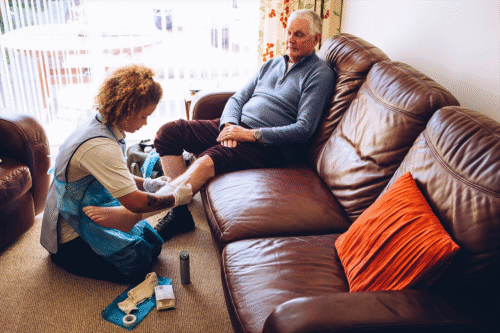Social Care
-
 Learning how and why adult sexual exploitation happens, how to identify and define it is crucial for anyone who has safeguarding responsibilities at any level. This training will give learners best practice advice on how to report and act on suspicions of abuse. This course covers a wide range of topics to help learners gain a full understanding of Adult Sexual Exploitation.
Learning how and why adult sexual exploitation happens, how to identify and define it is crucial for anyone who has safeguarding responsibilities at any level. This training will give learners best practice advice on how to report and act on suspicions of abuse. This course covers a wide range of topics to help learners gain a full understanding of Adult Sexual Exploitation. -
 This e-learning course is for anyone who works closely with children or in a capacity where they might encounter someone on the autism spectrum; for example, teachers, youth workers, carers, nurses and even customer service professionals. The Introduction to Autism Spectrum training course has been updated with help from subject matter experts to include more information on autism spectrum disorder (ASD) and to cover the Oliver McGowan case.
This e-learning course is for anyone who works closely with children or in a capacity where they might encounter someone on the autism spectrum; for example, teachers, youth workers, carers, nurses and even customer service professionals. The Introduction to Autism Spectrum training course has been updated with help from subject matter experts to include more information on autism spectrum disorder (ASD) and to cover the Oliver McGowan case. -
 When working in social care its essential to know how to help assist and move people in your care and other objects such as equipment. As a daily common task, it is incredibly important to help reduce the risk of harm to staff and service users. Discover the correct way to move and handle individuals and required equipment safely as well as understanding the relevant legislations, guidelines, and procedures to help minimise risks. This 30-minute course can be used as an introduction or as refresher training to ensure that all learners have up to date knowledge of Assisting and Moving, People and Objects.
When working in social care its essential to know how to help assist and move people in your care and other objects such as equipment. As a daily common task, it is incredibly important to help reduce the risk of harm to staff and service users. Discover the correct way to move and handle individuals and required equipment safely as well as understanding the relevant legislations, guidelines, and procedures to help minimise risks. This 30-minute course can be used as an introduction or as refresher training to ensure that all learners have up to date knowledge of Assisting and Moving, People and Objects. -
 Our introductory course is aimed at anyone who works with children, from social care workers to teachers, and wants to understand attachment theory. Attachment Theory is a well-established theory which illustrates the key role attachment plays in the development of a child through to adulthood, how they form relationships with others and how they perceive themselves. Using the context of attachment theory, our course is designed to provide you with insights into children’s behaviour and development, and what you can do to help a child who may be struggling.
Our introductory course is aimed at anyone who works with children, from social care workers to teachers, and wants to understand attachment theory. Attachment Theory is a well-established theory which illustrates the key role attachment plays in the development of a child through to adulthood, how they form relationships with others and how they perceive themselves. Using the context of attachment theory, our course is designed to provide you with insights into children’s behaviour and development, and what you can do to help a child who may be struggling. -
 Everyone wants to stay safe and healthy, and that’s why health and safety (H&S) at work is enshrined in law. Being unwell or put at risk of harm has wide implications for both the individual affected and the business they work for. When the Health and Safety at Work Act came into force in 1974, businesses were now responsible for keeping their employees safe and well. That included training them regularly in how to do that. This short course on Awareness of Health and Safety at Work helps you understand the importance of this topic.
Everyone wants to stay safe and healthy, and that’s why health and safety (H&S) at work is enshrined in law. Being unwell or put at risk of harm has wide implications for both the individual affected and the business they work for. When the Health and Safety at Work Act came into force in 1974, businesses were now responsible for keeping their employees safe and well. That included training them regularly in how to do that. This short course on Awareness of Health and Safety at Work helps you understand the importance of this topic. -
 Be introduced to the topic of basic life support and first aid with this short online course. Explore topics within the course such as what basic life support is, what accidents can happen in the workplace, what sudden illnesses could be whilst also understanding which tasks need specialist training.
Be introduced to the topic of basic life support and first aid with this short online course. Explore topics within the course such as what basic life support is, what accidents can happen in the workplace, what sudden illnesses could be whilst also understanding which tasks need specialist training. -

Care Certificate
£16.00Care Certificate training is an important part of any health and social care role. Our digital workbooks are the perfect support aid to the Care Certificate assessment, helping learners acquire the knowledge needed before they are assessed. The Care Certificate was introduced in 2015 as a way of ensuring that training and development for support roles in health and social care were consistent, and that everyone was working towards the same skills, knowledge and behaviour. It was updated in March 2025 to include the mandatory Oliver McGowan Training. -
 This course provides information on dealing with both Child Sexual Exploitation (CSE) and Adult Sexual Exploitation (ASE). Aimed at those who work with vulnerable individuals, it includes guidance on grooming, trafficking, consent and reporting. This course combines information on both Child Sexual Exploitation (CSE) and Adult Sexual Exploitation (ASE), both how they differ and what they have in common.
This course provides information on dealing with both Child Sexual Exploitation (CSE) and Adult Sexual Exploitation (ASE). Aimed at those who work with vulnerable individuals, it includes guidance on grooming, trafficking, consent and reporting. This course combines information on both Child Sexual Exploitation (CSE) and Adult Sexual Exploitation (ASE), both how they differ and what they have in common. -
 This course aims to give learners a deeper understanding of child criminal exploitation and gang-related issues by defining what these key terms mean. This training will also help learners to identify the signs and symptoms of abuse and what to do if they suspect a child or young person is becoming involved in gang activities. County lines is another crucial issue related to gang activities, within this training, learners will gain an understanding of this issue and how it can differ from other gang-related activities.
This course aims to give learners a deeper understanding of child criminal exploitation and gang-related issues by defining what these key terms mean. This training will also help learners to identify the signs and symptoms of abuse and what to do if they suspect a child or young person is becoming involved in gang activities. County lines is another crucial issue related to gang activities, within this training, learners will gain an understanding of this issue and how it can differ from other gang-related activities. -
 This Child Exploitation and Extra-familial Harm training has been designed for those working with at risk children or young people and covers the effects and impacts of exploitation and extra-familial harm of children. It has up-to-date information on CSE, learner challenges and scenarios for an interactive learning experience. Ensuring you can identify the signs and symptoms of child exploitation and extra-familial harm is crucial for anyone working with children.
This Child Exploitation and Extra-familial Harm training has been designed for those working with at risk children or young people and covers the effects and impacts of exploitation and extra-familial harm of children. It has up-to-date information on CSE, learner challenges and scenarios for an interactive learning experience. Ensuring you can identify the signs and symptoms of child exploitation and extra-familial harm is crucial for anyone working with children. -

Child Poverty Course
£30.00The modules in this course provide information on the potential causes of poverty, how to help children and their families, guidance on multi-agency working and the learner's roles and responsibilities as a practitioner. This course is for anyone who is working or will be working with children who may be in poverty or vulnerable to poverty. -
 The course describes the definition of collaboration and what it means in the workplace, including some of the challenges and solutions to effective and successful collaboration. This Collaborative Working Techniques course describes the definition of collaboration and what it means in the workplace, including some of the challenges and solutions to effective and successful collaboration.
The course describes the definition of collaboration and what it means in the workplace, including some of the challenges and solutions to effective and successful collaboration. This Collaborative Working Techniques course describes the definition of collaboration and what it means in the workplace, including some of the challenges and solutions to effective and successful collaboration.

